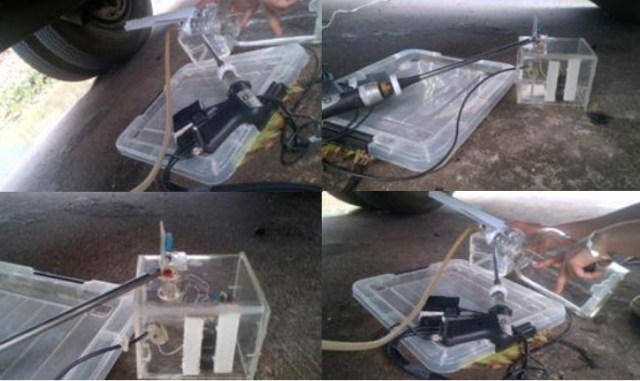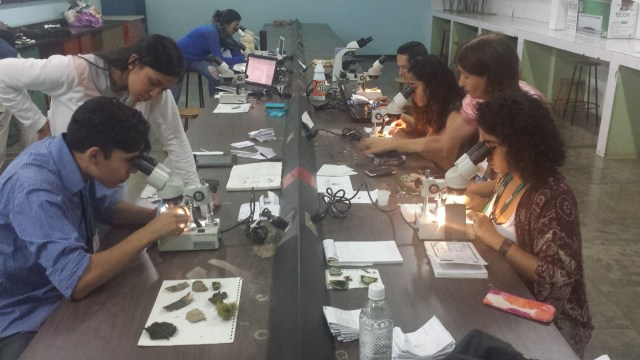
Air quality in Venezuela, especially in Táchira State, has been a mystery in recent years. For quite some time in this border state and in all of Venezuela, air quality has been an unknown, especially that data related to the use of monitoring and regulatory grade equipment located on stations.
By Anggy Polanco / Correspondent lapatilla.com
Although years ago there were air quality monitors, over time they have become damaged, obsolete or stolen, which means that the country and Venezuelans have very little information about the quality of the air they currently breathe, as was stated by the environmental engineer from the National Experimental University of Táchira (UNET) Marcos José Cárdenas González in an interview with lapatilla.com.
San Cristóbal, capital of Tachira State, has been experiencing a fairly dense and strong haze for several weeks, an indicator that the particulate matter present in the local atmosphere must be quite high, Cárdenas highlighted.
A similar situation is occurring in the capital of Norte del Santander, Cúcuta, in Colombia. There they are already applying corrective measures to prevent health problems among the most vulnerable people, and trying to contain the gases and toxic materials generated by some industries, as well as vehicular traffic.
Air quality reports from the Colombian institution CorpoNor warn that part of the pollution that affects Cúcuta comes from the Venezuelan side, since the predominant direction of the wind moves from Táchira to the North of Santander, therefore, pollution sources on the Venezuelan side are affecting the quality of the air that Colombians breathe.
Even in a video published by a group of pro-government councilors this March 18th in the afternoon from an improvised landfill in Ureña, with which they intended to deny that the pollution originates in part from the Venezuelan side, it is observed clearly the smoke that the hills of solid waste give off and are heading towards the Colombian side.
No parameters to measure against

The most recent report on air quality in Venezuela dates back to 2010, as part of the environmental indicators published by the National Institute of Statistics, and in it was seen that, for example, in the capital of Táchira there were two monitoring stations: one was located in the Ministry of Health and another in the Ministry of Infrastructure. Total suspended particles and lead (Pb) were measured, as detailed by engineer Cárdenas, who serves as academic staff of the Department of Environmental Engineering of UNET.He is also a professor at a university in Chile and technical support for a leading organization in air quality and climate change that collaborates with national and subnational agencies and governments on these issues in Latin America and the Caribbean.
The environmental engineer explained that based on the measurements of total suspended particles, verification was made to know the amount of lead present in the particulate material. These measurements reflected that, compared to Decree 638 for the year 2010, there was no non-compliance with the regulations. It could be said that the air quality in the city at that moment was within the thresholds allowed by national regulations.
It should be noted that the regulations of Decree 638 are old and date back to the 90s, which is why engineers consider that they should be updated, as the World Health Organization has been updating the ambient air quality guidelines, both in terms of adjusting the thresholds considered not detrimental to health, as well as adding new contaminants to consider in surveys and tests.
Poor air quality

In the Department of Environmental Engineering of the Experimental University of Táchira (UNET), through the work that interns and thesis students have done with the support of researchers, professors and the Dean of Research itself, some research has been carried out, since in this university there is some working equipment, somewhat old, but at times they have been able to use it to measure air quality in the city.
In 2018, an investigation was carried out in ‘Riberas del Torbes’, between the Cárdenas Municipality and San Cristóbal, which is very close to the ‘Puente Real’ Industrial Zone, where there are several industries such as potteries and a high volume of vehicular traffic. Two pollutants were measured there: carbon monoxide and carbon dioxide, and this showed that their levels were outside the limits imposed by regulations. Levels that do not necessarily mean that they cannot adversely impact health due to the country’s regulatory lag.
Marcos Cárdenas pointed out that as a result of this latest investigation, it was determined that the air quality in this point in the capital of Táchira was apparently good for the year 2018. However, the Department of Environmental Engineering, through the use of bioindicators with living beings, such as lichens, organisms that are sensitive to polluting agents (the more lichens exist, the better the air quality, the fewer lichens exist in the area, the worse the air quality), have found important indicators of heavy metals in the air of San Cristóbal, in addition to other pollutants that have positive correlations with respiratory diseases.
The expert highlighted that poor air quality mainly causes respiratory and cardiovascular diseases, but in Venezuela the great weakness is the lack of permanent monitoring of air quality for long time evaluation of air quality evolution in time.
There is a lack of monitoring with fine particulate matter of 2.5 micrometers or less, which are those that have been considered the most dangerous particles, and included within the Sustainable Development Goal is monitoring air quality using precisely that indicator. According to the WHO, these particles are so small that they can enter the bloodstream through the lung alveoli, affecting multiple human organs.
Venezuela without measurement index

“We really don’t know about this because there is no monitoring,” said the specialist.
Unlike Colombia, where there are monitoring stations, where results are shown and compared with an air quality and health index, on the Venezuelan side there is no formally established air quality index or other monitoring tools. air quality management such as alert and emergency levels, action plans for atmospheric contingencies, emissions inventories, health impact assessments, air management or decontamination programs among other actions are very important to prevent and mitigate the atmospheric pollution. However, the country does have experts in these areas.
The low air quality that can be observed in Táchira in recent weeks, which can affect the health of Tachira residents, is mainly due to the burning of grasslands, agricultural remains, burning to expand agricultural borders, among other events. Thus, burning causes polluting agents to accumulate, which worsens when there is no rain due to high atmospheric stability, explained the expert on the subject.
Therefore, Professor Marcos Cárdenas stressed that we must pay attention to burning and wildfires, since burning is punishable and prohibited by the Environmental Criminal Law. It happens that all these pollutants are inhaled by people.
Hence, he highlighted the need to apply strong campaigns so that people understand this and look for other options that replace the burning of agricultural waste and vegetation fires are properly attended to.
Other aspects that must be addressed are the reduction of pollution by the means of transportation and the use of vehicles such as bicycles or electric vehicles, in addition to improving the quality of the fuels used in the country.
He warned that society has the right to demand information about the quality of the air breathed in Venezuela, since they have the right to breathe clean air.

